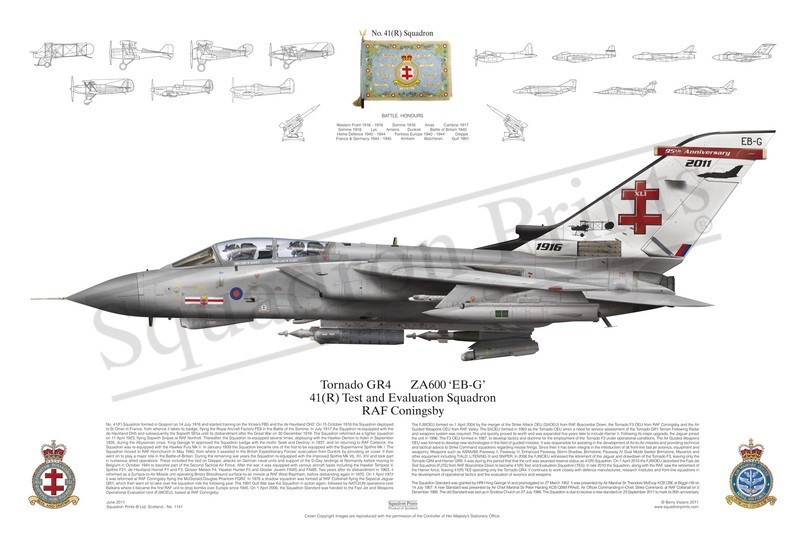#1141 Tornado GR4

Purchased products will not feature the Squadron Prints watermark
Description
Squadron Prints Lithograph No. 1141 - Tornado GR4, ZA600 \'EB-G\', 41(R) Test and Evaluation Squadron, RAF Coningsby.
No. 41(F) Squadron formed in Gosport on 14 July 1916 and started training on the Vickers FB5 and the de Havilland DH2. On 15 October 1916 the Squadron deployed to St Omer in France, from whence it takes its badge, flying the Royal Aircraft Factory FE8 in the Battle of the Somme. In July 1917 the Squadron re-equipped with the de Havilland DH5 and subsequently the Sopwith SE5a until its disbandment after the Great War on 30 December 1919. The Squadron reformed as a fighter squadron on 11 April 1923, flying Sopwith Snipes at RAF Northolt. Thereafter, the Squadron re-equipped several times, deploying with the Hawker Demon to Aden in September 1935, during the Abyssinian crisis. King Geroge VI approved the Squadron badge with the motto ‘Seek and Destroy’ in 1937, and on returning to RAF Catterick, the Squadron was re-equipped with the Hawker Fury Mk II. In January 1939 the Squadron became one of the first to be equipped with the Supermarine Spitfire Mk I. The Squadron moved to RAF Hornchurch in May 1940, from where it assisted in the British Expeditionary Forces’ evacuation from Dunkirk by providing air cover. It then went on to play a major role in the Battle-of-Britain. During the remaining war years the Squadron re-equipped with the improved Spitfire Mk Vb, XII, XIV and took part in numerous allied operations. These included the raid on Dieppe, attacks on German naval units and support of the D-Day landings at Normandy before moving to Belgium in October 1944 to become part of the Second Tactical Air Force. After the war, it was equipped with various aircraft types including the Hawker Tempest V, Spitfire F21, de Havilland Hornet F1 and F3, Gloster Meteor F4, Hawker Hunter F5 and Gloster Javelin FAW5 and FAW8. Two years after its disbandment in 1963, it reformed as a Surface-to-Air Missile unit operating Bristol Bloodhound surface-to-air missile at RAF West Raynham, before disbanding again in 1970. On 1 April 1972 it was reformed at RAF Coningsby flying the McDonald-Douglas Phantom FGR2. In 1976 a shadow squadron was formed at RAF Coltishall flying the Sepecat Jaguar GR1, which then went on to take over the squadron role the following year. The 1991 Gulf War saw the Squadron in action again, followed by NATO/UN operations over Balkans where it became the first RAF unit to drop bombs over Europe since 1945. On 1 April 2006, the Squadron Standard was handed to the Fast Jet and Weapons Operational Evaluation Unit (FJWOEU), based at RAF Coningsby.
The FJWOEU formed on 1 April 2004 by the merger of the Strike Attack OEU (SAOEU) from RAF Boscombe Down, the Tornado F3 OEU from RAF Coningsby and the Air Guided Weapons OEU from RAF Valley. The SAOEU formed in 1983 as the Tornado OEU when a need for service assessment of the Tornado GR1 Terrain Following Radar and weapons system was required. The unit quickly proved its worth and was expanded five years later to include Harrier II. Following its major upgrade, the Jaguar joined the unit in 1996. The F3 OEU formed in 1987, to develop tactics and doctrine for the employment of the Tornado F3 under operational conditions. The Air Guided Weapons OEU was formed to develop new technologies in the field of guided missiles. It was responsible for assisting in the development of Air-to-Air missiles and providing technical and tactical advice to Strike Command squadrons regarding missile firings. Since then it has been integral in the introduction of all front-line fast jet avionics, equipment and weaponry. Weapons such as ASRAAM, Paveway II, Paveway III, Enhanced Paveway, Storm Shadow, Brimstone, Paveway IV, Dual Mode Seeker Brimstone, Maverick and other equipment including TIALD, LITENING III and SNIPER. In 2006 the FJWOEU witnessed the retirement of the Jaguar and drawdown of the Tornado F3, leaving only the Tornado GR4 and Harrier GR9. It was during this period that that the unit was awarded reserve status as 41(R) Squadron. On 1 April 2010 the FJWOEU absorbed the Fast Jet Test Squadron (FJTS) from RAF Boscombe Down to become 41(R) Test and Evaluation Squadron (TES). In late 2010 the Squadron, along with the RAF, saw the retirement of the Harrier force, leaving 41(R) TES operating only the Tornado GR4. It continues to work closely with defence manufactures, research institutes and front-line squadrons in the development of operational tactics and the evaluation of avionics and weapons.
The Squadron Standard was granted by HRH King George VI and promulgated on 27 March 1952. It was presented by Air Marshal Sir Theodore McEvoy KCB CBE at Biggin Hill on 14 July 1957. A new Standard was presented by Air Chief Marshal Sir Peter Harding KCB CBIM FRAeS, Air Officer Commanding-in-Chief, Strike Command, at RAF Coltishall on 5 December 1985. The old Standard was laid up in Scottow Church on 27 July 1986. The Squadron is due to receive a new standard on 23 September 2011 to mark its 95th anniversary.
You may also like
-
Harrier GR9, Naval Strike Wing mug
ZD406801 Sqn; 800 Sqn; Naval Strike WingRAF Cottesmore
